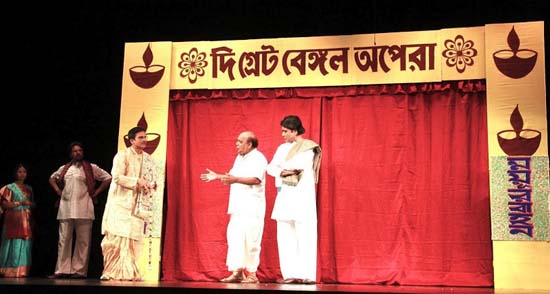
Home
Board of Directors
Objectives
Past Events
Notee Binodini
04/08/2023
Shah Jahan
04/10/16
Tiner Talowar
05/10/13
Kolikaler Buli
11/20/09
Raktakarobi
11/17/06
Future Plans
Constitution/Bylaws
Contact
us
|
|
|

|
Tiner Talowar
Rockville,
MD, USA
May 2013
Playbill ·
Flyer
The drama
was surtitled in English. Click
here
for a snapshot
|
Photo Albums |
|
|
|
Inside both albums, click on the
first picture to enlarge and enjoy
the slide show |
Why Tiner Talowar Today?
-Jogabrata Majumdar

Peter Brook, the renowned
histrionic personality, who distinguished
himself in a variety of art forms like theater,
opera, film and became the Director of Royal
Shakespeare Company, London, in the year 1962,
once said "The theater exits in movement". Being
a true follower of this sentiment and in pursuit
of quality theater, Natyakrishti has been
demonstrating its views and sincere commitment
towards addressing the socio-political menace of
today's world through its histrionic
productions, presented in the past and even
today.
|
We, the
members of Natyakrishti, believe that certainty and
continuity are the key factors towards achieving a goal,
and shall always strive to portray our beliefs on the
stage. Through logical analysis of the events around the
world today, we feel that the key component of all
sources of unrest is autocracy, which clearly is built
up on greed, torture and subjugation. This creates a
threat to world peace and brings peril to human
relationship in terms of social, economical and of
course, political arena.
Today, mankind
has a commitment to work for a better world to live in.
The use of logical precision in explaining and analyzing
the cause behind the vested interests and the motive for
subjugation should be manifested in our attempt to
prepare meaningful theatrical productions.
Natyakrishti's productions are not only unique in terms
of their content, but are also exceptional in nature.
Our previous presentations, like Rakta Karobi and Koli
Kaler Buli bear ample testimony to the philosophy of our
histrionic journey. We do not believe in using our time
and effort to present a theatrical production that
carries no thematic value. We would like to see no
histrionic personalities making attempts to divert
public sentiment towards fruitless issues; rather, their
responsibilities should be to collect factual
information from the history of human civilization, and
present them on the stage as documentary evidence,
thematically blended with aesthetic considerations in
the realm of theatre. Thus, their duty would be to lead
the audience to review their beliefs through their
legitimate conscience, which we consider to be the
priority of every sensible human soul.
Tiner Talowar is a drama that
provides a clear message consistent to our thoughts. In
the later part of the nineteenth century, dramas like
"Neel Darpan", "Sati ki Kalankini", "Gajadananda",
"Surendra Binodini", "Police of the Pig and Sheep" were
being staged by some fearless heroes, namely Girish Ch,
Ghose, Upendranath Das, Amritalal Bose, Ardhendu Shekhar
Mustafi, Mohendra Gupta, Motilal Sur, Nati Binodini,
Sukumari Devi and others. Soon, the British rulers
realized that these brave personalities, through these
dramas, have set off to expose the very character of the
autocratic rulers that were in power at that time. The
Government unilaterally imposed an act called "Indian
Dramatic Act 1976", and put those heroes behind bars.
To provide a sense of light and
shade to the portrayal of the principal characters
namely, Benimadhab, Basundhara, Mayna, Birkrishna,
Priyanath, and also the minor characters like Methar
(Sweeper), Mudi, Bachaspati, Lambert, the dialogs and
actions provide contrast and severe conflict between two
different principles. In this drama, the author directs
our attention to the struggle for freedom from
autocracy. At the beginning, the Methar (Sweeper)
challenges Benimadhab with a firm voice, "Can you write
a drama about my life? --- no way, you will lose your
class." With this statement, the Methor sets the tone of
the drama, which then continues on up to the end, when
finally Benimadhab converts from a self-centered and
egoistical drama director to a fighter against tyranny.
Tiner Talowar established a
landmark in the Indian theatrical movement, and provided
a clear vision and certainly a roadmap for the theme of
histrionic endeavor of all times. It succeeded in
conveying a message which calls for the freedom of human
spirit by standing up against tyranny --- and certainly
this message transcends time and centuries, for as long
as mankind has to cope with oppression and tyranny.
Let us salute those histrionic
leaders whose countless, courageous contributions
towards Indian theatrical arena shaped the
socio-cultural consciousness of the audience. Let us
commemorate the sacrifices they made, without which we
would not be where we are today.
|
|
|

